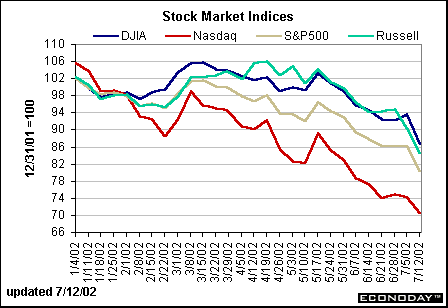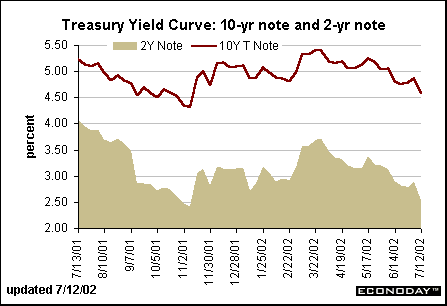
How long can we go?
Investors returned to their desks after the Independence weekend and decided that they had been altogether too optimistic on Friday, July 5th. Bearish sentiment returned with a vengeance this past week. Friday's economic data wasn't completely unfriendly but investors nevertheless emphasized the disappointments. Even though retail sales showed that consumer spending remained on track for June and the second quarter, players were more worried about preliminary consumer confidence figures which showed a drop for the month. Share prices had recovered most of their losses until the Office of Management and Budget (OMB) released a higher-than-expected $165-billion estimate for the fiscal 2002 deficit. This was worse than expected and stock prices fell in the dumps again.
It is interesting that the Dow Jones Industrials posted the largest drop this week (-7.4 percent) while the Nasdaq composite index fell by the least amount (still a whopping 5.1 percent). Until mid-June, the Russell 2000 had been outperforming other market indexes but has since performed about on par with the DJIA (at least relative to year end). Even though the Dow posted the largest drop this week, it remains the best performing index since year-end. Still, a small consolation for holders of blue chip companies.

Next week could be good or bad for investors depending on Greenspan's remarks and the round of earnings that are scheduled. If earnings meet expectations, it could calm investors. Greenspan is likely to try to be soothing; whether he is misinterpreted by market players or not is a different question altogether.
Rising prices falling Treasury yields
The Treasury market was closely aligned to the stock market this week. Whenever stock prices fell, bond prices rose (and subsequently bond yields fell). Judging by the sharp drop in yields on the 2-year and 5-year notes, it appears that market expectations of Fed policy are changing. One major Wall Street firm predicted this week that the Fed won't raise rates until well into 2003. Some analysts fear that the corporate scandal headlines will deteriorate into job losses and a drop in consumer demand. There is no question that the recovery is unusual given that the stock market is falling rather than rising. But the economic data continue to show slow and steady growth. A double-dip in the stock market doesn't signal a double-dip recession, as stocks have declined many more times than the economy over the past 100 years. Nevertheless, bond investors are reconsidering the state of affairs. It is interesting that yields have fallen nearly as rapidly in 2002, with a flat federal funds rate target, than in 2001 when the Fed reduced the target 11 times by a combined 475 basis points.

 |


Markets at a Glance • Recap of US Markets • The Economy • The Bottom Line • Looking Ahead
|